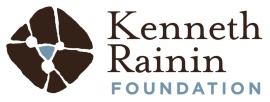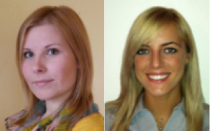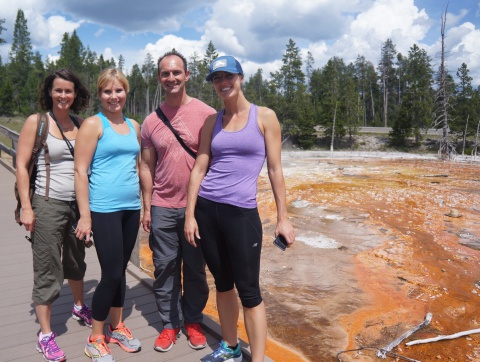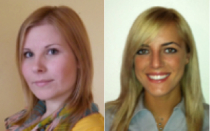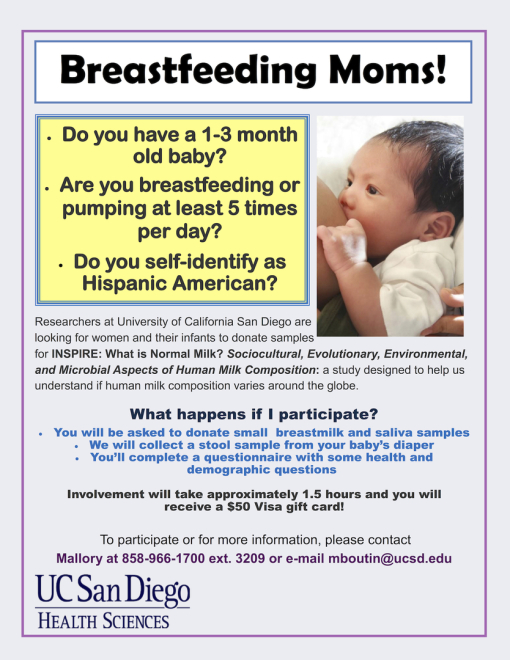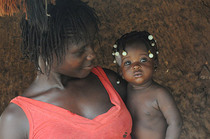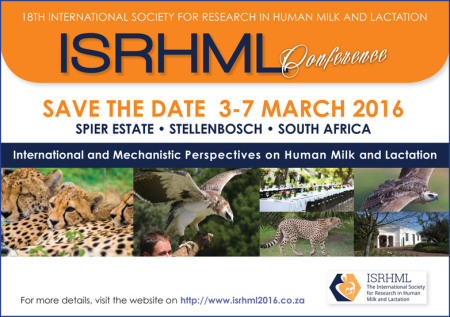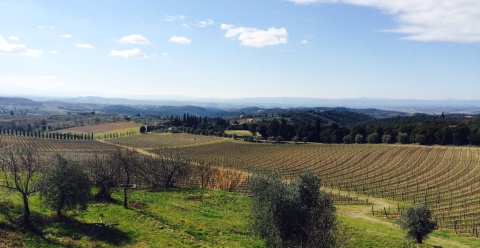
News Blog - 2015
November 20, 2015
Gerber Foundation awards research grant to study link between HMO and obesity risk
The Bode lab is part of a research project that studies the link between human milk oligosaccharides (HMO) and infant body composition and obesity risk. The project is led by Dr. Michael Goran, Director of the Childhood Obesity Research Center at the University of Southern California (USC) and supported by a $350,000 research grant from the Gerber Foundation.
The project continues our collaboration on HMO and obesity risk with Dr. Goran at USC and Dr. Rob Knight here at UC San Diego.
Click Here to visit the Gerber Foundation website.
November 5, 2015
Lars appointed to Advances in Nutrition Editorial Board
Invited by the Editor in Chief Dr. Katherine Tucker (Professor of Nutritional Epidemiology, and Director of the NIH/NHLBI Center for Population Health and Health Disparities) and approved by both the Publications Management Committee and the Executive Board of the American Society for Nutrition (ASN), Lars joins the Editorial Board of the international, peer-reviewed journal Advances in Nutrition (AN).
The appointment to the AN Editorial Board is for a term of two years and eligible for reappointment as indicated in the ASN Bylaws.
Advances in Nutrition publishes review articles that highlight the significance of recent research in nutrition and illustrate the central role of nutrition in the promotion of health and prevention of disease. The journal's 2014 Impact Factor is 5.386.
Click Here to visit the AN website.
September 25, 2015
Manuscript on HMO and infant body composition accepted for publication in The American Journal of Clinical Nutrition
Evidence linking breastfeeding to reduced risk for developing childhood obesity is inconclusive, yet prior studies have not considered variation in specific components of breast milk that may have effects on early development. This is the first staudy that examined whether variations in the composition of human milk oligosaccharides (HMOs) correlate with infant growth and body composition at 1- and 6-months of age. HMO composition was analyzed by high performance liquid chromatography and infant growth (length and weight) and body composition (percent fat, total fat, fat-free mass) were measured by DXA. Increased HMO diversity and evenness at 1-month were associated with lower total and percent fat mass at 1-month. At 1-month, each 1-μg/mL increase in lacto-N-fucopentaose (LNFP) I was associated with a 0.40 kg lower infant weight (P=0.03). At 6-months, each 1-μg/mL increase in LNFPI was associated with a 1.11 kg lower weight (P=0.03) and a 0.85 g lower fat-free mass (P=0.01). At 6-months, each 1-μg/mL increase in LNFPI was associated with a 0.79 g lower fat mass (P=0.02) while DSLNT and LNFPII were associated with a 1.92 g (P=0.02) and 0.42 g higher fat mass (P=0.02). At 6-months, each 1-μg/mL increase in FDSLNH and LNnT was associated with a 0.04% higher (P=0.03) and 0.03% lower body fat (P<0.01), respectively. These new findings support the hypothesis that differences in HMO composition in mother’s milk are associated with infant growth and body composition.
The study is part of a larger ongoing collaboration between the Bode lab and Rob Knight's group both at UC San Diego and Dr. Michael Goran's group at the University of Southern California as well as Dr. David Field's group at the University of Oklahoma Health Sciences Center.
The American Journal of Clinical Nutrition (AJCN) publish original research studies relevant to human and clinical nutrition, and has an impact factor of 6.8.
Click Here for a list of our publications.
August 10, 2015
Manuscript on human milk, HMO and HIV transmission accepted for publication in Journal of Virology
The study was led by Dr. Angela Wahl, Research Instructor in the lab of Dr. J. Victor Garcia-Martinez in the Division of Infectious Diseases at the University of North Carolina at Chapel Hill, and evaluated the in vivo HIV inhibitory activity of breast milk obtained from HIV-positive transmitting and non-transmitting mothers. In addition, the study assessed the species-specificity and biochemical characteristics of milk’s in vivo HIV inhibitory activity and evaluated breast milk’s ability to inhibit other modes of HIV infection.
Other study contributors included Dr. Katie Hinde at Havard University, Dr. Louise Kuhn at Columbia University, and Dr. Grace Aldrovandi at the Children’s Hospital Los Angeles and the University of Southern California.
Journal of Virology (JVI) explores the nature of the viruses of animals, archaea, bacteria, fungi, plants, and protozoa, and has an impact factor of 4.4.
Click Here for a list of our publications.
August 8, 2015
Bode lab seeks outstanding Postdoctoral Fellows
The Bode lab is seeking outstanding postdoctoral fellows with passion for and experience in intestinal physiology, microbe-host interactions and inflammation.
Successful applicants will join a multidisciplinary team led by Dr. Lars Bode and work in one of the most vibrant research environments in the world.
We are seeking enthusiastic and highly motivated individuals with a PhD in a relevant area (biomedical sciences, physiology, biochemistry, nutrition, etc.). Strong verbal and written communication skills as well as analytical skills are required. Experience with human milk research, glycobiology or microbiome/metabolomics research is desired.
Interested applicants should submit their CV and a brief statement of research interests and accomplishments to lbode@ucsd.edu.
Click Here for a list of job opportunities in the Bode lab.
August 7, 2015
Bode lab receives Kenneth Rainin Foundation Innovator Award
The $100,000 award enables us to test the hypothesis that human milk oligosaccharides (HMO) not only benefit the breast-fed infant, but can also be used to develop new, safe and effective interventions for children and adults suffering from inflammatory bowel disease.
Inflammatory Bowel Disease (IBD), which includes Crohn's Disease and Ulcerative Colitis, is a chronic inflammatory condition of the colon and small intestine that affects over 1.4 million people in the US alone. IBD is without a definite medical cure and commonly requires a lifetime of care. Current interventions carry significant adverse effects and are generally not safe for long-term use and prevention. Novel safe and effective agents are urgently needed to treat and prevent IBD.
The project is a collaboration with Dr. Lars Eckmann's lab (intestinal inflammation) and Dr. Rob Knight's lab (gut microbiome), both working with the Bode lab in the UCSD Biomedical Research Facility.
Dr. Bode is going to present the project at the annual Kenneth Rainin Foundation Innovations Symposium in San Francisco, California, July 20-22, 2016.
Click Here to visit the Kenneth Rainin Foundation website.
July 24, 2015
Sabrina and Chloe receive FASEB SRC Travel Award
Dr. Sabrina Etzold and Chloe Autran in the Bode lab each receive a Travel Award to participate in the 1st FASEB Science Research Conference on "Origins and Benefits of Biologically Active Components in Human Milk" in Big Sky, Montana, July 19-24, 2015.
Both Sabrina and Chloe presented a poster and were also selected to give an oral presentation in the main conference sessions.
July 22, 2015
Lars, Chloe and Sabrina speak at FASEB SRC
Lars, who is also the conference organizer and chair, gave "An Introduction to Human Milk Oligosaccharides (HMO)" at the opening of the conference.
Chloe's abstract "Human milk 3'-sialyllactose reduces proinflammatory cytokine expression in activated macrophages" was selected for oral presentation in the session "Oligosaccharides - Potential benefits for the breastfed infant". The project is a collaboration with Dr. Philip Gordts at UCSD.
Chloe also presented the poster "Sialylated galacto-oligosaccharides and 2'-fucosyllactose reduce necrotizing eneterocolitris in neonatal rats", which was done in collaboration with Dr. Margriet Schoterman at FrieslandCampina, The Netherlands, and Dr. Johannis Kamerling at the University of Groningen, The Netherlands.
Sabrina's abstract "Elucidating the meachnisms by which human milk oligosaccharides (HMO) protect against necrotizing enterocolitis (NEC)" was selected for oral presentation in the "Data Blitz" session.
The Bode lab was involved in five different abstracts presented at the conference, including work with Dr. Evelyn Jantscher-Krenn, who has been a postoctoral fellow in the Bode lab and is now starting her own group at the Medical University of Graz, Austria.
Click Here to visit the conference website.
Click Here for Past and Upcoming Speaking Engagements.
July 1, 2015
Sabrina and Chloe receive Seed Grant in Microbiome Science
Dr. Sabrina Etzold and Chloe Autran in the Bode lab receive a Seed Grant in Microbiome Science.
The UC San Diego initiative is funded by the Department of Pediatrics, the Collaborative Center for Mass Spectrometry, the UCSD Microbiome Initiative, and the School of Pharmacy and Pharmaceutical Sciences. It aims to spark new research collaborations with a microbiome and metabolomics focus that will lead to exciting new science.
The project is a collaboration with Dr. Rob Knight's lab (microbiome) and Dr. Peter Dorrestein's lab (metabolomics).
June 18, 2015
Manuscript on HMO and fungal infections accepted for publication
Our manuscript "Human Milk Oligosaccharides Inhibit Candida albicans Invasion of Premature Human Intestinal Epithelial Cells" has been accepted for publication in The Journal of Nutrition.
Human Milk Oligosaccharides (HMO) have been shown to be effective in the fight against viral, bacterial and protozoan parasite pathogens. We now report that HMO may also play a role in impacting fungal-host interactions.
Candida albicans, a prevalent fungal colonizer of the neonatal gut, causes the overwhelming majority of invasive fungal disease in premature infants and is highly associated with concurrent diagnoses of necrotizing enterocolitis and focal intestinal perforation, life-threatening intestinal disorders.
Treatment with HMO significantly reduced invasion of human premature intestinal epithelial cells (pIECs) by C. albicans in a dose dependent manner. In particular, reduced invasion was observed when using a physiologic concentration of HMO in the model. The decreased invasive potential of C. albicans for pIECs correlated with a delay in hyphal growth and morphogenesis as well as a reduction in the ability of C. albicans to associate with pIECs, processes important for the initial pathogenesis steps of C. albicans infections.
The project is a collaboration with Dr. Cheryl Gale's lab in the Department of Pediatrics at the University of Minnesota, Minneapolis.
The Journal of Nutrition publishes peer-reviewed original research papers covering all aspects of experimental nutrition in humans and other animal species; special articles such as reviews and biographies of prominent nutrition scientists; and issues, opinions, and commentaries on controversial issues in nutrition. The Journal of Nutrition has an impact factor of 4.2.
Click Here for a list of our publications.
June 8, 2015
Chloe selected to participate in Rady Micro-MBA Course
Chloe Autran, Staff Research Associate and PhD graduate student in the Bode lab, has been selected to participate in the 2015 Micro-MBA Course organized by the Rady School of Management at the University of California, San Diego.
Chloe will have a unique opportunity to gain an introduction to business concepts, network with business professionals, and become a part of the entrepreneurial science/tech community at Rady.
The Rady School of Management at UC San Diego is a professional school within one of the top-ranked institutions in the U.S. for higher education and research. In accordance with the school’s mission, the Center for Executive Development educates highly skilled, ethical leaders for innovation-driven organizations.
In addition to her scientific training, participation in the Rady Micro-MBA course will help Chloe prepare and be highly competitive for a postgraduate career.
Click Here to visit the Rady School of Management website.
Click Here for more information on the Rady Micro-MBA Course
June 2, 2015
Bode lab receives UCSD Academic Senate grant to explore the role of HMO in the perinatal space
May 22, 2015
NSF INSPIRE Study now open for enrollment in San Diego
The Bode lab is part of the INSPIRE study, and the San Diego study site is now open for enrollment.
The project “What is Normal Milk?- Exploring Sociocultural, Evolutionary, Environmental, and Microbial Aspects of Human Milk Composition” is sponsored by the National Science Foundation (NSF) and aims to test the overarching hypothesis that human milk composition has evolved to vary with genetic, environmental, and sociocultural conditions.
To participate or for more information, please contact:
Mallory Boutin at 858-966-1700 ext. 3209 or by email at mboutin@ucsd.edu.
May 7, 2015
Lars joins UNICEF/WHO Breastfeeding Advocacy Inititive Working Group
Invited by Dr. France Begin, Senior Nutrition Adviser at UNICEF, Lars joins the UNICEF/WHO Breastfeeding Initiative as a member of the Knowledge and Evidence Building Working Group.
UNICEF and WHO, along with a range of other partners, have formed a global advocacy initiative to increase political commitment to and investment for breastfeeding as the cornerstone of child nutrition, health and development.
The advocacy initiative has three strategic goals for the next three years:
- Foster leadership and alliances and effectively integrate and communicate breastfeeding messages;
- Mobilize resources and promote accountability; and
- Build knowledge and evidence to enhance breastfeeding policies, programmes, financing and communication.
Lars is going to represent the International Society for Research in Human Milk and Lactation (ISRHML) with the goal to involve a network of experts in the field that provide evidence and knowledge base.
ISRHML is a non-profit organization that aims to promote excellence in research on all aspects of human lactation including the composition of human milk and the effects of human milk/breastfeeding upon the infant or the mother. ISRHML also aims to establish and maintain liaison with other organizations or groups that share mutual interests including but not limited to other academic/research societies, relevant governmental agencies, and, public health authorities.
Click Here to download a brochure with initiative details.
Click Here to visit the UNICEF website.
Click Here to visit the WHO website.
Click Here to visit the ISRHML website.
April 16, 2015
ISRHML 2016 Conference highlighted in thisweek@ucsandiego
Click Here to read the article in thisweek@ucsandiego.
Click Here to visit the conference website.
Click Here to visit the ISRHML website.
March 31, 2015
Lars speaks at IHMC in Luxembourg
Invited by Dr. Kjersti Aagaard, MD PhD, at the Baylor College of Medicine in Houston, Lars gives a presentation on "Interactions between breastmilk oligosaccharides and mother/infant microbiome" at the 5th International Human Microbiome Congress in Luxemburg, March 31 to April 2, 2015.
The congress entitled "Future Directions for Human Microbiome Research in Health and Disease" is organized by the International Human Microbiome Consortium (IHMC).
Clikc Here to visit the conference website.
Click Here to visit the IHMC website.
Click Here for Past and Upcoming Speaking Engagements.
March 11, 2015
ISRHML 2016 website now live online
Click Here to visit the conference website.
Click Here to visit the ISRHML website.
Click Here for Past and Upcoming Speaking Engagements.
March 2, 2015
Lars speaks at Gordon Research Conference Glycobiology
Invited by Dr. Markus Aebi at the ETH Zurich, Lars presents a talk on "Human Milk Oligosaccharides as direct and indirect primers for the infant microbiome" at the Gordon Research Conference "Glycobiology: Glycans as mediators of interactions between molecules, cells and organisms" at the Renaissance Tuscany Il Ciocco Resort, Lucca (Barga) in Italy.
Click Here for a link to the conference website.
Click Here for Past and Upcoming Speaking Engagements.
February 3, 2015
Gal3BP manuscript accepted in Journal of Neonatal-Perinatal Medicine
Our manuscript " Galectin-3 binding protein in human preterm infant umbilical cord plasma" has been accepted for publication in the Journal of Neonatal-Perinatal Medicine.
Galectin-3 binding protein (Gal3BP) is a glycoprotein isolated in colostrum that may be an immunologically active component with effects on the neonatal immune system. Gal3BP had been found in the blood of term newborn infants, but had not been studied in preterm infants.
We now report that umbilical cord plasma Gal3BP concentrations are elevated in prematurity, which may reflect inflammatory states in infant and mother. 64 preterm and 30 term umbilical cord plasma samples were analyzed. By univariate analysis, Gal3BP concentration was elevated in the setting of prematurity, maternal diabetes, antenatal steroid exposure, and increasing maternal parity (p < 0.05); and decreased in chorioamnionitis (p = 0.03). Using a multiple linear regression model prematurity, chorioamnionitis and maternal diabetes remained significant.
The study was led by Dr. Christina Chan, who was a neonatology fellow in the Bode lab from 2011 to 2013 and is now a clinical instructor, neonatology at Stanford University, School of Medicine.
Click Here for a list of our publications.
January 12, 2015
FASEB SRC on Human Milk Bioactives website now live online
Information and registration for the new FASEB Science Research Conference "Origins and Benefits of Biologically Active Components in Human Milk" is now available online.
The conference is co-chaired by Lars Bode and Shelley McGuire and will be hosted in Big Sky, Montana, July 19-24, 2015.
FASEB is the Federation of American Societies for Experimental Biology. FASEB's mission is to advance health and welfare by promoting progress and education in biological and biomedical sciences through service to our member societies and collaborative advocacy.
Click Here to visit the conference website for information and registration.





